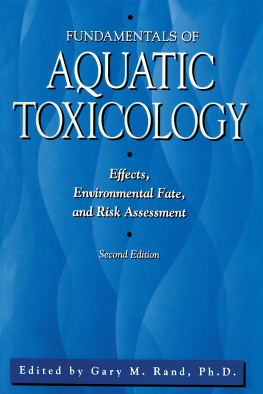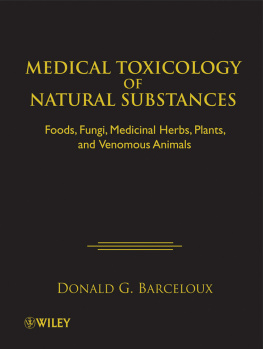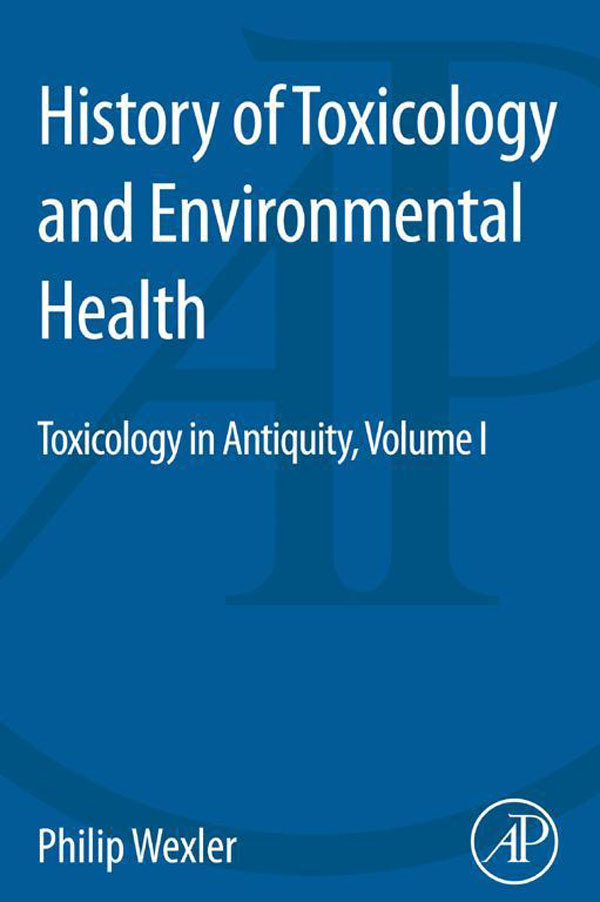List of illustrations
- Figures in Chapter 1
- Figures in Chapter 2
- Figures in Chapter 4
- Figures in Chapter 10
Landmarks
Table of Contents
History of Toxicology and Environmental Health
Toxicology in Antiquity, Volume I
Philip Wexler

Copyright
Academic Press is an imprint of Elsevier
225 Wyman Street, Waltham, MA 02451, USA
525 B Street, Suite 1800, San Diego, CA 92101, USA
The Boulevard, Langford Lane, Kidlington, Oxford, OX5 1GB, UK
32 Jamestown Road, London NW1 7BY, UK
Radarweg 29, 1043 NX Amsterdam, The Netherlands
Copyright 2014 Elsevier Inc. All rights reserved.
No part of this publication may be reproduced or transmitted in any form or by any means, electronic or mechanical, including photocopying, recording, or any information storage and retrieval system, without permission in writing from the publisher. Details on how to seek permission, further information about the Publishers permissions policies and our arrangement with organizations such as the Copyright Clearance Center and the Copyright Licensing Agency, can be found at our website: www.elsevier.com/permissions
This book and the individual contributions contained in it are protected under copyright by the Publisher (other than as may be noted herein).
Notices
Knowledge and best practice in this field are constantly changing. As new research and experience broaden our understanding, changes in research methods, professional practices, or medical treatment may become necessary.
Practitioners and researchers must always rely on their own experience and knowledge in evaluating and using any information, methods, compounds, or experiments described herein. In using such information or methods they should be mindful of their own safety and the safety of others, including parties for whom they have a professional responsibility.
To the fullest extent of the law, neither the Publisher nor the authors, contributors, or editors, assume any liability for any injury and/or damage to persons or property as a matter of products liability, negligence or otherwise, or from any use or operation of any methods, products, instructions, or ideas contained in the material herein.
British Library Cataloguing in Publication Data
A catalogue record for this book is available from the British Library
Library of Congress Cataloging-in-Publication Data
A catalog record for this book is available from the Library of Congress
ISBN: 978-0-12-800045-8
For information on all Academic Press publications visit our website at store.elsevier.com

Toxicology in Antiquity
DedicationFor Nancy, Yetty, Will, Jake, and Lola
With appreciation to the Toxicology History Association and the scholarly contributors to this series
Many thanks, as well, to Elsevier, in particular Molly McLaughlin, for expertly navigating us through the publication terrain.
List of Contributors
Adrienne Mayor , Research scholar, Classics Department and History and Philosophy of Science and Technology Program, Stanford University, Stanford, California, USA
Alain Touwaide , Institute for the Preservation of Medical Traditions and Smithsonian Institution, Washington, D.C., USA
Benny Pfanz, BSc , Faculty of Geosciences, Ruhr-University, Bochum, Germany
W. Benson Harer
Former Clinical Professor of Obstetrics and Gynecology, Western University of Health Sciences, Pomona, California, USA
Former Adjunct Professor of Egyptian Art at California State University, San Bernardino, California, USA
Francesco DAndria
Prof. Dr., University of Salento, Italy
Department of Cultural Heritage, Director of the Italian Archaeological Mission in Hierapolis of Phrygia, Turkey
Francois Retief , Honorary Research Fellow, Department of Greek, Latin and Classical Studies, University of the Free State, Bloemfontein, South Africa
Galip Yce , Professor, Hacettepe University, Faculty of Engineering, Department of Geological Engineering, Hydrogeology Division, Beytepe, Ankara, Turkey
George Androutsos , Professor and Chairman, History of Medicine Department, Medical School, National and Kapodistrian, University of Athens, Athens, Greece
George Papatheodorou , Prof. Dr., Laboratory of Marine Geology and Physical Oceanography, University of Patras, Patras, Greece
Gonzalo M. Sanchez , (Retired from) Avera Medical Group, Pierre, South Dakota, USA
Gregory Tsoucalas , Faculty of Medicine, History of Medicine, University of Thessaly, Larissa, Greece
Hardy Pfanz , Prof. Dr., Chair of Applied Botany, Director of Botanic Gardens, University of Duisburg-Essen, Campus Essen, Essen, Germany
Jelle Zeilinga de Boer , Harold T. Stearns Professor of Earth Science, Emeritus, Wesleyan University, Middletown, Connecticut, USA
Louise Cilliers , Honorary Research Fellow, Department of Greek, Latin and Classical Studies, University of the Free State, Bloemfontein, South Africa
Marianna Karamanou , Scientific Collaborator, History of Medicine Department, Medical School, National and Kapodistrian University of Athens, Athens, Greece
Markos Sgantzos , Faculty of Medicine, History of Medicine, University of Thessaly, Larissa, Greece
Okan Arihan , Faculty of Medicine, Department of Physiology, Yuzuncu Yil University, Turkey
Seda Karaoz Arihan , Faculty of Letters, Department of Anthropology, Yuzuncu Yil University, Turkey
Walter DAlessandro , Dr., Instituto di Geofisica e Vulcanologia, Sezione di Palermo, Palermo, Italy
Yiannis Manetas , Prof. Dr., Laboratory of Plant Physiology, Department of Biology, University of Patras, Patras, Greece
Foreword
John Duffus
The Edinburgh Centre for Toxicology
Henry Ford was famously contemptuous of history. He is on record as saying, History is more or less bunk. Its tradition. We dont want tradition. We want to live in the present and the only history that is worth a tinkers damn is the history we make today. Personally I prefer George Santayanas view: [W]hen experience is not retained, as among savages, infancy is perpetual. Those who cannot remember the past are condemned to repeat it. But how relevant is historical toxicology? What can we modern toxicologists (and our regulatory authorities) learn from the past? One important lesson is that toxicity can affect people anywhere, in any society, at any level, and for many years, without anyone being aware of it. Toxic effects on the brain may be responsible for misjudgments by political leaders that can have disastrous consequences. Toxicity may have caused the fall of empires. Jerome Nriagu . There is clearly still much scope for further research in this area.
Another empire that may have suffered the consequences of toxicity at the highest level is that of China. It seems possible that the latter days and decisions of the Chinese Emperor Qin Shi Huang may have been adversely affected by exposure to mercury. According to the historian Sima Qian, this emperor was buried in a mausoleum with 100 rivers of flowing mercury in addition to his now famous terra cotta army. Reportedly, Qin Shi Huang died as a result of ingesting mercury pills, prescribed by his alchemists and court physicians in order to make him immortal .










